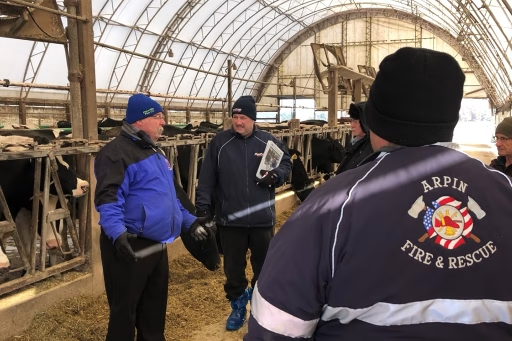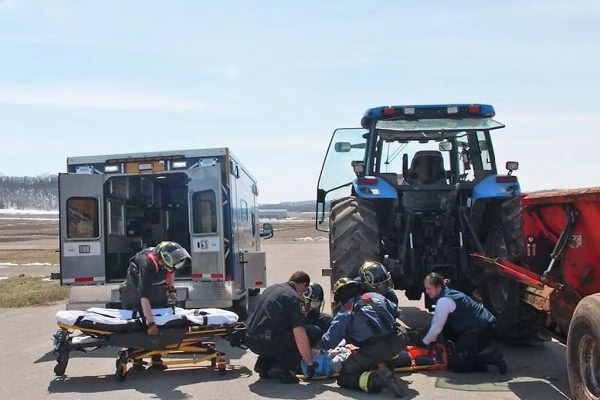Researchers have long known that antimicrobial resistance varies geographically. Now, a team of researchers across UW-Madison and the Marshfield Clinic Research Institute (MCRI) are conducting a study to better understand the social and patient-specific factors that might inform some of those geographic differences. The team is investigating questions of whether, for example, there is a positive or negative association between agricultural work and antibiotic resistance. Someday, the results could lead to precision treatments for microbial infections based on a person’s job or neighborhood.
The study is one of four projects that the UW Institute for Clinical and Translational Research (ICTR) is funding to advance rural health equity. Three of the projects, which begin in December 2023, are funded through an ICTR pilot award program known as MCRI and UW-Madison Collaborative Awards. The program is designed to support research partnerships between two co-principal investigators and their teams, with one based at each institution.
The study of antimicrobial resistance, titled “Understanding Antimicrobial Resistance from Rural to Urban Wisconsin” and funded for $100,000, will be co-led by Drs. Laurel Legenza, a postdoctoral fellow and Director of Global Health at the UW School of Pharmacy, and Joshua Petrie, an associate research scientist at MCRI.
Legenza has previously undertaken multiple studies of geographic variance in antimicrobial resistance between neighborhoods, the smallest geographic unit of census data. Petrie has done extensive epidemiological work using the Marshfield Clinic’s large sets of electronic health record data. The researchers will study antimicrobial resistance to two bacteria across a large patient population, including rural areas of northern Wisconsin as well as smaller semi-urban areas, such as Wausau, Eau Claire, and Stevens Point.
Legenza and Petrie had a fortuitous meeting at an ICTR event. In May 2023, they both attended the UW-MCRI Joint Research Day at the Health Sciences Learning Center in Madison, where Petrie presented MCRI’s work tracking COVID-19 infections and reinfections. Legenza, who had previously received an MCRI and UW-Madison Collaborative Award in 2019, saw an opportunity to expand her productive collaboration. Legenza said, “I was impressed by MCRI’s ongoing research in epidemiology and infectious diseases in rural communities. There is really extraordinary expertise at Marshfield that can contribute to this project. This award is going to allow us to better serve rural communities.”
While Legenza is a returning awardee, ICTR is also funding two first-time MCRI-UW collaborations for awards up to $50,000:
- Heidi Kloster, associate professor of pediatrics at UW, and Andrea Swenson, associate research scientist at MCRI, will co-lead the proposal “Caregiver Stories: Family Perspectives on How Healthcare Providers May Promote Optimization of Health for Children with Medical Complexity.” Their study will collect data from caregivers of children with medical complexity, which the investigators define as children with multiple chronic conditions, several functional limitations, and extensive health care needs. Children with medical complexity require more than 50 hours of home-delivered health care each week; the study aims to identify barriers to health care access that these families face in rural settings.
- Alexandra Linz, associate research scientist at MCRI, and Alana Sterkel, assistant professor in the UW Department of Pathology and Laboratory Medicine, will be funded for their proposal “Yeast-Based Identification for Blastomyces in Rural Laboratories.” They identify Blastomycosis, a life-threatening fungal infection, as a significant health challenge in rural communities in Wisconsin as well as the Ohio and Mississippi river valleys, in part because rural laboratories have limited diagnostic capacity. Their study proposes streamlined protocols for culturing the fungus to enhance access to diagnostic testing, improve test sensitivity, and shorten the time to receive results.
Evidence to Implementation

The Rural Firefighters Delivering Agriculture Safety and Health (RF-DASH) program trained personnel from the Arpin Volunteer Fire Department in Central Wisconsin. RF-DASH is one of four rural health equity projects that ICTR funded in late 2023.
The fourth ICTR project, funded through an Evidence to Implementation (E2I) Award, will seek to advance safety in agricultural work. Implementing safety interventions can be difficult in agriculture, where many farms and ranches have 10 or fewer unrelated workers, exempting them from Occupational Safety and Health Administration (OSHA) standards. Instead, safety advice must come from family and community members. Surveys have reported that farm operators express trust in rural firefighters and EMS personnel as potential advisors about injury prevention.
Since 2016, the National Farm Medicine Center at MCRI has been developing the Rural Firefighters Delivering Agriculture Safety and Health (RF-DASH) program. Under principal investigator Dr. Casper Bendixsen, the program conducts training on agricultural emergencies, including mapping of local farms, analyzing agricultural hazards, performing first aid on farms, and approaching the farm community. The program has trained 78 fire and EMS personnel across 10 states and five Canadian provinces, reaching 30 Wisconsin fire and EMS departments.
In November 2023, Bendixsen received an Evidence to Implementation pilot award of $75,000. By the end of the grant period, RF-DASH intends to have trainees in at least 60 Wisconsin departments, doubling the program’s reach. At least two trainees will be engaged in departments that are predominantly of the Plain community, which can include Amish and Mennonite people, among others.
The award will support the improvement of the program’s SaferFarm.org site, as well as refresher courses for previous trainees with updated information based on new risk assessment and reduction guidelines. The award will help the program to develop a sustainable payment model for trainings, refresher courses, and other resources that will be affordable to rural fire departments while also generating revenue to sustain the program in the long term.
Bendixsen said, “The RF-DASH program is an example of ICTR’s efforts to not only improve the health and wellbeing of rural community residents but also to do so with intense community involvement. From the ground up, farmers and firefighters have worked alongside researchers to get us to this point. The RF-DASH team is grateful for ICTR’s support to further implement the program in more Wisconsin communities.”
